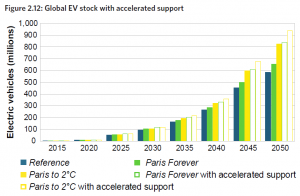by Kathryn Luu December 5, 2019, via Energy Post

The MIT Energy Initiative (MITIE) has completed a 3-year study of “Mobility of the Future” to plot a decarbonised pathway for light duty vehicles (i.e. cars) globally. Wide in scope and detail, it covers government policies, consumer choices and technologies, combining their multiple and complex impacts to make their assessments. Kathryn Luu at MITIE reviews the final 220-page report. For consumers, cost, convenience, and — increasingly — carbon emissions play their role. Added to that is “car pride” – a form of status signalling, so any ambitions to simply reduce car ownership will have to confront this. Technology-wise, improving powertrain efficiency and deploying alternative fuel vehicles will be crucial, along with the necessary decarbonising of fuelling infrastructure. And with the right policy support, these technologies could see total cost-of-ownership reach parity with existing internal combustion engine vehicles in 10 years in the U.S. Meanwhile in China, six major cities and one province have adopted car ownership restriction policies in response to severe congestion and air pollution – sometimes you don’t have to wait for the technology to reduce emissions. One interesting conclusion picked out by the author is that the emergence of ride-sharing and driverless cars could increase congestion if its cost and convenience beats public transport.
MIT Energy Initiative report charts pathways for sustainable personal transportation. Technological innovations, policies, and behavioral changes will all be needed to reach Paris climate agreement targets. By Kathryn Luu at MIT Energy Initiative. MIT News.
In our daily lives, we all make choices about how we travel and what type of vehicle we own or use. We consider these choices within the constraints of our current transportation system and weigh concerns including costs, convenience, and — increasingly — carbon emissions. “Insights into Future Mobility,” a multidisciplinary report released in November by the MIT Energy Initiative (MITEI), explores how individual travel decisions will be shaped by complex interactions between technologies, markets, business models, government policies, and consumer preferences — and the potential consequences as personal mobility undergoes tremendous changes in the years ahead. Read More